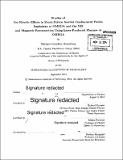Studies of ion kinetic effects in shock-driven inertial confinement fusion implosions at OMEGA and the NIF and magnetic reconnection using laser-produced plasmas at OMEGA
Author(s)
Rosenberg, Michael Jonathan
DownloadFull printable version (107.9Mb)
Other Contributors
Massachusetts Institute of Technology. Department of Physics.
Advisor
Richard Petrasso and Miklos Porkolab.
Terms of use
Metadata
Show full item recordAbstract
Studies of ion kinetic effects during the shock-convergence phase of inertial confinement fusion (ICF) implosions and magnetic reconnection in strongly-driven, laser-produced plasmas have been facilitated by the use of shock-driven ICF implosions and diagnosed using both mature and newly-developed nuclear diagnostics. Ion kinetic effects that are likely to be significant early in ICF implosions, as strong shocks create a high-temperature, moderate-density plasma with an ion mean free path approximately the size of the fuel region, have, for the first time, been explored in a comprehensive experimental campaign. These experiments at the OMEGA laser facility, in which the ion mean free path was systematically varied in a series of shock-driven implosions, have demonstrated that measured fusion yields are increasingly discrepant relative to the predictions of hydrodynamic codes with increasing ion mean free path. The enhanced transport of fuel ions out of the hot plasma region and the reduction in fusion reactivity due to the depletion of high-energy tail ions are responsible. These effects have also been inferred in shock-driven implosions at the National Ignition Facility. The universal plasma phenomenon of magnetic reconnection has been explored in strongly-driven, high-[beta] laser-produced plasmas, driving reconnection in a regime relevant to astrophysical environments, such as the Earth's magneto-pause. Using shock-driven ICF implosions as a proton source to probe magnetic fields, the first systematic laboratory experiments to study asymmetric magnetic reconnection have been conducted. These experiments have shown that the rate of reconnection in this strongly flow-driven system is dictated by the flow velocity and is largely insensitive to initial asymmetries in density, ram pressure, and geometry. Related experiments have probed the collision of parallel magnetic fields to assess the effect of strong flows on magnetic fields in the absence of reconnection. Experiments using high-resolution proton radiography have revealed small-scale electron jets that demonstrate the importance of two-fluid effects in permitting a fast reconnection even when reconnection is driven by strong plasma flows. This work has improved understanding and spurred further experimental and theoretical inquiry into kinetic ion behavior in ICF implosions and magnetic reconnection in regimes rarely accessed in the laboratory.
Description
Thesis: Ph. D., Massachusetts Institute of Technology, Department of Physics, 2014. Cataloged from PDF version of thesis. Includes bibliographical references.
Date issued
2014Department
Massachusetts Institute of Technology. Department of PhysicsPublisher
Massachusetts Institute of Technology
Keywords
Physics.